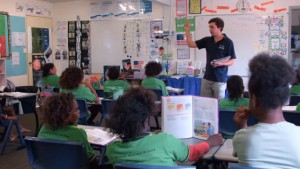Home » Commentary » Opinion » Indigenous students’ hard-won literacy progress
· Ideas@TheCentre
 Improving the persistently very low literacy level of Indigenous children in remote areas of the Northern Territory and Western Australia is an urgent but extremely difficult task.
Improving the persistently very low literacy level of Indigenous children in remote areas of the Northern Territory and Western Australia is an urgent but extremely difficult task.
A new evaluation of the Flexible Literacy for Remote Primary Schools Program (FLFRPSP) implemented by Good to Great Schools Australia (GGSA) finds early signs that the Direct Instruction and Explicit Direct Instruction programs are improving reading and writing, despite the initial resistance in some schools and sectors.
The evidence presented here, as well as an extensive literature gathered around direct instruction, demonstrates that this pedagogy can and should have a positive impact on children’s literacy outcomes.
The report methodically sets out both the obstacles and the potential for success. One of the most pernicious problems is high levels of teacher and principal turnover. Northern Territory FLFRPSP schools had average teacher rates of 161% in 2015 and 58% in 2016. Most had to replace their principal at least once a year — sometimes two or three times.
The challenges of teaching children in remote schools to read and write standard Australian English are numerous and complex. For the majority, English is their second language, and for some their third language.
Many children have supportive families and come to school eager and ready to learn — but there are also many with dysfunctional home lives and congenital learning difficulties. School attendance is generally poor. It is easy to understand why progress is hard won.
Nonetheless, there has been progress. Measurement of improvement in the Northern Territory was hampered by the absence of early literacy data for schools in the government sector, so the clearest statistical gains have been in Western Australian schools.
The report — produced by the Centre for Program Evaluation at Melbourne University — takes a balanced but positive position on the potential future impact of the FLFRPSP, cautioning that “educational reform in any complex environment takes times and deserves time.” Would that all programs were evaluated so thoroughly and honestly.
Indigenous students’ hard-won literacy progress